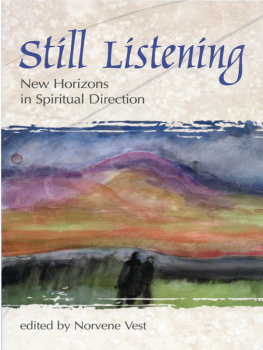Margaret Guenther - Holy Listening: The Art of Spiritual Direction
Here you can read online Margaret Guenther - Holy Listening: The Art of Spiritual Direction full text of the book (entire story) in english for free. Download pdf and epub, get meaning, cover and reviews about this ebook. year: 1992, publisher: Cowley Publications, genre: Religion. Description of the work, (preface) as well as reviews are available. Best literature library LitArk.com created for fans of good reading and offers a wide selection of genres:
Romance novel
Science fiction
Adventure
Detective
Science
History
Home and family
Prose
Art
Politics
Computer
Non-fiction
Religion
Business
Children
Humor
Choose a favorite category and find really read worthwhile books. Enjoy immersion in the world of imagination, feel the emotions of the characters or learn something new for yourself, make an fascinating discovery.

- Book:Holy Listening: The Art of Spiritual Direction
- Author:
- Publisher:Cowley Publications
- Genre:
- Year:1992
- Rating:3 / 5
- Favourites:Add to favourites
- Your mark:
- 60
- 1
- 2
- 3
- 4
- 5
Holy Listening: The Art of Spiritual Direction: summary, description and annotation
We offer to read an annotation, description, summary or preface (depends on what the author of the book "Holy Listening: The Art of Spiritual Direction" wrote himself). If you haven't found the necessary information about the book — write in the comments, we will try to find it.
Margaret Guenther uses the images of the spiritual director as host, teacher, and midwife to describe the ministry of spiritual direction today.
Holy Listening: The Art of Spiritual Direction — read online for free the complete book (whole text) full work
Below is the text of the book, divided by pages. System saving the place of the last page read, allows you to conveniently read the book "Holy Listening: The Art of Spiritual Direction" online for free, without having to search again every time where you left off. Put a bookmark, and you can go to the page where you finished reading at any time.
Font size:
Interval:
Bookmark:
I am grateful to the trustees of the General Theological Seminary and to my faculty colleagues for the gift of time that enabled me to write this book.
I am also grateful to Daniel Warren, who brought me together with Cowley Publications and its editor, Cynthia Shattuck. From working with her, I have learned that good editors have a great deal in common with good spiritual directors: she has been a midwife, teacher, and generous host.
Finally, I thank Alan Jones, whose friendship and encouragement helped me to find my voice.
CHAPTER ONE
H e looked up and saw three men standing near him. When he saw them, he ran from the tent entrance to meet them, and bowed down to the ground. He said, My lord, if I find favor with you, do not pass by your servant. Let a little water be brought, and wash your feet, and rest yourselves under the tree. Let me bring a little bread, that you may refresh yourselves, and after that you may pass onsince you have come to your servant. So they said, Do as you have said. And Abraham hastened into the tent to Sarah, and said, Make ready quickly three measures of choice flour, knead it, and make cakes. And Abraham ran to the herd, and took a calf, tender and good, and gave it to the servant, who hastened to prepare it. Then he took curds and milk, and the calf that he had prepared, and set it before them; and he stood by them under the tree while they ate.
Genesis 18:2-8
Do not neglect to show hospitality to strangers, for by doing that some have entertained angels without knowing it.
Hebrews 13:2
Let all guests who arrive be received like Christ, for He is going to say, I came as a guest, and you received Me.
Rule of St. Benedict (Chapter 53)
E very morning my day begins with a look at the little black appointment book. Usually the space is crowded with names and phone numbers, and the shape of the day is predictable. But occasionally the name scribbled in is unfamiliar to me: someone is coming for the first time, presumably to explore the possibility of spiritual direction, but even that is not always clear. Im not always sure how the person found mea suggestion from the parish clergy, a casual reference by a friend of a friend, the grapevine, or even the New York telephone book. Despite a preliminary phone conversation to set up the appointment, we are strangers to each other, names without faces or stories.
I am about to show hospitality to a stranger, a prospect simultaneously exhilarating and disquieting. I become self-conscious; they are expecting someone older, younger, taller, shorter, at least someone who looks like a spiritual director. While my friends and colleagues are used to my office with its books and pictures, will a stranger be put off? And what about this stranger? What does he want of me? Will he be interesting, tedious, challenging, orthis is, after all, New Yorkderanged? These thoughts do not always run through my mind in clear sequence, but they hover just beneath the surface when a potential directee presents himself for the first time. I feel my kinship with Abraham when he lifted up his eyes and beheld three strangers standing in front of him. My guest, like his, has paused on a journey. Do I really want to stop what I am doing and invite him to wash his feet and rest under the tree before he passes on? Geographically, the journey is rarely impressivea subway ride from uptown, a commuter train trip from New Jersey, a five-minute walk through the seminary close. The person standing at my office door is rarely disheveled or dust-covered and would resist any attempt of mine to wash his feet. But spiritually, he has come a great distance and is still far from home.
Like all of us, the person seeking spiritual direction is on a journey. Since the expulsion from Eden, we have been a people on the move, despite attempts at self-delusion that we have somehow arrived, We follow in the footsteps of our peripatetic Lord, always on the way, our faces turned resolutely or reluctantly toward Jerusalem. Mobility is our way of life. How many of us live within ten, even one hundred miles of our birthplace? And how many of us have any idea where we will die? Physically, our life is a journey. Spiritually, too, we are always on the way, in via, when we long to be in patria. We are travelers, and we are weary and homesick.
It is a fact of life that travelers cannot survive in comfort without hospitality. However prudent their planning and abundant their supplies, if the journey goes on long enough they will need the care of a host, someone who offers a temporary home as a place of rest and refreshment. Thus Abraham offered water for his angelic visitors to wash the dust from their feet, fresh-baked bread and meat to ease their hunger. Thus, too, McDonalds golden arches and the familiar logo of the Holiday Inn beckon us, promising dubious refreshment and bland surroundings. (The best surprise is no surprise, we are told. On the spiritual journey, the reverse might well be true!) Even the most self-sufficient cannot escape this need for hospitality: modest recreational vehicle and splendiferous mobile home alike turn into those discreetly labelled areas in national parks that invite them to empty their waste tanks before continuing on.
In the harsh circumstances of the desert or the frontier, hospitality offers more than comfort: it also ensures physical survival. Spiritually, too, we cannot make it through the desert or across the frontier alone, but must depend on the kindness of strangers. Yet those strangers upon whom we depend are not really strangers, but our sisters and brothers in Christ. They are the hosts, the givers of hospitality, who sustain us on the journey, our spiritual friends and directors.
Host is a word with many connotations, not all of them comfortable in the context of a discussion of spiritual direction. Talk shows have hostsyet one would scarcely think of Johnny Carson or David Letterman as bestowers of hospitality in the biblical sense. Flight attendants used to be called hostesses, pretty young women who made sure that passengers were buckled into immobility before distributing drinks and little plastic containers of plastic food. A grim and sterile vision of hospitality!
Perhaps English speakers have devalued the word host. Certainly it lacks the freshness and immediacy of the German Gastgeberthe guest-giver, the one who gives to guestsand Gastfreundschaftguest-friendship, the special friendship shown by hosts to their guests. The spiritual director is a host who gives to her guests, the bestower of guest-friendship. She is a host in the truest and deepest sense, reflecting the abundant hospitality shown by the host at the heavenly banquet.
Getting Ready
Anyone who has ever given a dinner party or entertained weekend guests knows that hospitality is hard work, made even harder by the necessity that it appear effortless. Abraham had it easy: while he greeted his guests effusively, offering them the best that he has, his servant was butchering and dressing the calf, and Sarah was scurrying around inside the tent making cakes. For most of us nowadays, and certainly for those who practice spiritual direction as a ministry of hospitality, it is not so easy to delegate the real (i.e. tedious and painstaking) work to others. but the first step in being a good host, for dinner or for spiritual direction, is to get ready, to have the preparation done so that the scurrying may cease and the guest be greeted graciously.
Guests provide a helpful discipline. Left on our own, we can walk endlessly around disorder and uncleanness, vowing to do something about the state of our house some time, but not now. We may even come to love our untended garbage, to treasure it or at least to take it for granted. But when an honored guest is coming, we carry out the trash, restore objects to their places, and create an uncluttered, clean, and welcoming space. So it is also for spiritual directors. The first task is one of housecleaning, of creating our own inner order. We must know ourselves well, both our dark corners and our airless placesthe spots where dust collects and mold begins to grow. It is not enough to push our rubbish into the closet and shut the door, nor to lower blinds and dim the lights so that the dirt doesnt show, although these are tempting tricks for harried caretakers of houses and of souls. No, we must clean our house, and then keep cleaning it so that we have a worthy place when we invite others to rest and refreshment.
Font size:
Interval:
Bookmark:
Similar books «Holy Listening: The Art of Spiritual Direction»
Look at similar books to Holy Listening: The Art of Spiritual Direction. We have selected literature similar in name and meaning in the hope of providing readers with more options to find new, interesting, not yet read works.
Discussion, reviews of the book Holy Listening: The Art of Spiritual Direction and just readers' own opinions. Leave your comments, write what you think about the work, its meaning or the main characters. Specify what exactly you liked and what you didn't like, and why you think so.






